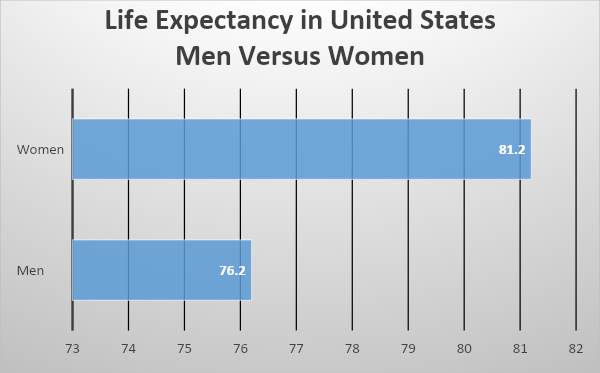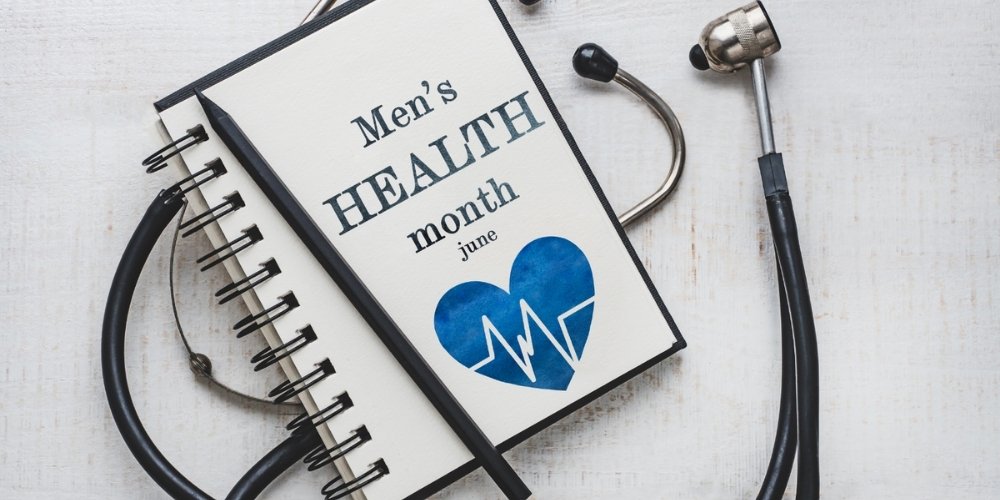The Centers for Disease Control and Prevention (CDC) reports that, on average, American men die five years sooner than American women. The CDC shares that the leading causes of morality in men are heart disease, cancer and accidental injuries.
The good news is that some of these health issues are preventable or easier to manage with the proper medication if detected early. Unfortunately, most men avoid seeing a doctor for routine check-ups and often wait until there is a severe problem before they seek medical attention.
This June, during national men’s health month, we will share some helpful tips that men can use to take control of their health, improve their quality of life, and help shorten the mortality gap between men and women.
Why Mortality Rates Are Higher for Men
Numerous studies have shown that men are generally less healthy during their lifetime and have higher mortality rates than women. Here are some major factors that contribute to these statistics:
- A higher percentage of men choose not to visit a doctor for annual check-ups and preventative care than women. Men tend to seek medical attention only when it is unavoidable and necessary to relieve pain or discomfort.
- Men tend to have unhealthier eating habits than women, leading to heart disease, hypertension, obesity, cancer, and type 2 diabetes.
- A more considerable percentage of men drink excessive amounts of alcohol, smoke tobacco, and use other harmful narcotics than women, leading to heart, lung, and liver diseases, different types of cancers, obesity, and type 2 diabetes.
- Men internalize their feelings more than women, leading to mental health issues, insomnia and other sleep-related problems, hypertension, diabetes, and stroke.
- Men are more prone to engage in risker, more dangerous, and violent behavior than women, leading to more accidental injuries, disability, and death.

Fortunately, there are positive lifestyle changes that men can make to improve their overall health for a chance to live a longer and more enjoyable life.
Top 4 Tips to Help Men Live Longer and Healthier
While genetic predisposition can play a factor in men’s overall health, there are some positive lifestyle changes that men can make to help increase their life expectancy and improve their quality of life.
Here are our top four health tips for men:
Tip #1 – Get a Primary Care Physician
Building a positive, long-term doctor-patient relationship with a primary care physician (PCP) is crucial to maintaining overall health for longevity and quality of life. PCPs provide their patients with continuous and comprehensive care, including preventive, acute, and chronic care in inpatient and outpatient facilities. PCPs are also patient advocates who can help coordinate and recommend other medical specialists when needed.
When looking for a primary care provider, here are a few critical factors to consider:
- Find a primary care practice that specializes in family medicine. Having a primary care provider who can take care of you and your entire family is convenient and beneficial, especially if there are genetic predispositions within your family history. They can better assist you in navigating the healthcare system to get you the appropriate medical care you and your family require.
- Not all primary care practices are created equal, so look for one that uses an accountable and evidence-based approach. Accountable and evidence-based providers strive to provide the highest quality care with a patient-first focus.
- Look for a primary care physician who uses a whole-health approach, like a Doctor of Osteopathic Medicine (DO). Unlike an MD (Doctor of Medicine), a DO does not just treat your symptoms but instead will work with you to identify the root cause of your medical conditions to recommend the best treatments.
Tip #2 – Eat a Healthy, Nutrient-Rich Diet
The Standard American Diet (SAD) is calorie-dense but lacks the nutrients the body needs to function correctly and ward off diseases. SAD is full of highly processed foods with tons of saturated fats, refined carbohydrates, and sugar. SAD, unfortunately, is one of the leading causes of heart disease, type 2 diabetes, hypertension, and obesity afflicting millions of American men.
Fortunately, men can significantly improve their health by eating a more nutrient-dense diet. Good nutrition incorporates whole grains, fish, lean meats, poultry, fruits, vegetables, and nuts rich in nutrients, vitamins, and minerals that provide the proper support for your body.
In addition, men should consider swapping out sugary soft drinks and high fructose fruit juices for water instead. Water is an excellent way to keep your body hydrated and helps flush out toxins. Drinking water before a meal can help you with portion control and overeating.
Tip #3 – Maintain a Physically Active Lifestyle
In today’s electronic-obsessed society, most of us probably spend an excessive amount of time in front of a computer. And the coronavirus pandemic has only exacerbated this problem. Numerous studies have shown that even adding small amounts of physical activities to daily routines can yield tremendous benefits to your mental and physical wellbeing.
An excellent way to maintain a physically active lifestyle is to incorporate activities you enjoy doing into your daily routine. Consider adding cardio, resistance training, walking, swimming, biking, gardening, golfing, etc. The point is to choose activities that you enjoy doing, get you moving at a moderate pace, and are sustainable long-term. Consistency is the key to healthy weight management and reducing stress. Start by doing at least 20 minutes a day and work your way up to 30-45 minutes, even an hour a day.
By combining a healthy diet of nutrient-rich foods with daily physical activities, most men can significantly reduce their chances of getting one or more chronic conditions such as heart disease, type 2 diabetes, hypertension, and obesity.
Tip# 4 – Stop Consuming Alcohol, Tobacco, and Harmful Narcotics
A lifetime of substance abuse can take a toll on men’s health, primarily if they use harmful and illegal substances as coping mechanisms to help them deal with stress, anxiety, physical and mental health issues.
The CDC reports that:
- A higher percentage of men consume more excessive amounts of alcohol than women, and men are 2X more likely to binge drink than women.
- On average, men are more likely to use tobacco products, such as cigarettes or cigars, at higher rates than women.
- In general, men have a higher propensity to misuse prescription drugs and consume more harmful narcotics (or illegal drugs) at higher rates than women. These substance abuse issues resulted in higher percentages of emergency room visits and overdose deaths for men than women.
Men’s Health Month: Facts and FAQs

Most men need help when it comes to taking care of their health. That’s why this June, during men’s health awareness month, we wanted to provide some important men’s health information to help the men in your life live a longer and healthier life.
Men’s Health: Facts You Need to Know
- More than 40% of men only visit a doctor when they have a severe medical condition
- Men who sleep seven or eight hours per night are at 50% lower risk of getting cardiovascular diseases than men who sleep five hours are less per night (Science Daily)
- Over 60% of men in the United States are overweight or obese (National Institutes of Health)
- More than 700,000 men in the US are diagnosed with cancer every year; resulting in almost 300,000 deaths (Men’s Health Resource Center)
- According to the American Cancer Society, over 240,000 men are diagnosed with prostate cancer each year; it is the most common cancer among men in the US and the second leading cause of death
- Over 350,000 men die from heart disease each year; it is the leading cause of deaths among American men (CDC)
Men’s Health: Frequently Asked Questions (FAQs)
- Q: I am a 53-year old male. When should I get my colon cancer screening?
- A: Men with no family history of cancer should start screenings at age 50. Those with a family history should start sooner, at age 40 or 10 years before the age of a 1st-degree relative diagnosis.
- Q: What are my colon cancer screening options?
- A: Options include: 1) a colonoscopy – every ten years if normal; 2) fecal occult blood test – annually; 3) flex sigmoidoscopy – every five years, with fecal occult every three years; 4) stool DNA (Colorguard) – every three years
- Q: I am a 58-year old male smoker, and I have not seen a doctor in over ten years. What should I get done if I come in for a physical exam?
- A: Based on your history, here is a list of screening tests that you can expect to be performed at your physical: 1) one-time HIV screening; 2) full lipid panel; 3) colorectal cancer screening; 4) diabetes risk assessment; 5) blood pressure measurement; 6) lung cancer screening and 7) hepatitis C screening
Ready to Take Control of Your Health?

At Mason Park Medical Clinic, our patient’s healthcare is our top priority. We are a primary care practice specializing in family medicine. Our team of dedicated medical practitioners uses an accountable and evidence-based approach to healthcare, allowing us to provide the highest quality care for you and your family.
Our managing physician, Dr. Quyen Trinh, DO, is a board-certified primary care physician in Katy, TX; nationally recognized by the NCQA for diabetes and heart/stroke management and care; recipient of the 2021 TX Top Docs award.
New patients and their families are welcome at Mason Park Medical Clinic. Give us a call at (281) 646-0740 to book an in-person or virtual call with a member of our medical staff today. We look forward to helping you take control of your health.




